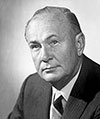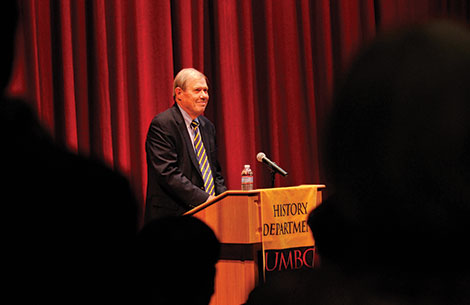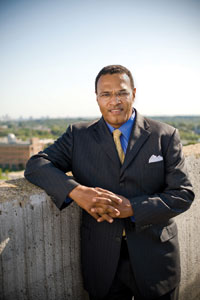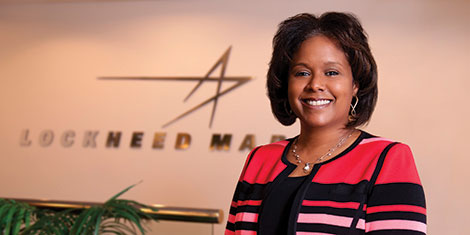CALL TO HISTORY
The proscenium theatre of UMBC’s recently-opened Performing Arts and Humanities Building was perhaps the most appropriate venue for this year’s W. Augustus Low Lecture in History.
The lecturer was John Jeffries, dean of UMBC’s College of Arts, Humanities and Social Sciences (CAHSS) and professor of history, who will retire from the university on June 30. Among the greatest legacies of his 40 years of scholarship and service to UMBC – much of it as leader of the Faculty Senate and the college – was his guiding hand in making the new building a reality, and literally cementing the university’s continuing commitment to the arts and humanities.
The capacity crowd gave Jeffries two standing ovations – both before and after his lecture, which was entitled “A Life in History: Reflections on Studying Politics and Policy in Twentieth Century America.”
The lecture took the audience through Jeffries’ journey from majoring in history as an undergraduate on a Navy ROTC scholarship at Harvard University in the late 1950s and early 1960s and a five year career in the U.S. Navy to graduate studies at Yale University and a career in academe that took hold at UMBC in 1973.
Yet Jeffries’ lecture was as much a tale of the shifting currents in the study of his chosen subject – 20th century electoral politics and policy in the United States – as it was a personal reminiscence. Jeffries recalled the excitement of entering the discipline when the “new political history” was in the ascendance. It was a moment when historians were reshaping the field with “systematic, quantitative and social-science approaches to the study of American politics” and seeking to uncover larger currents and patterns in the nation’s political history.
Though the “new political history” itself was subject to critiques and corrections in subsequent decades, Jeffries made a compelling case for its emphasis on the centrality of “ethnocultural attachments and antagonisms in voting” by pointing to the persistence of its influence in recent elections.
Jeffries also explained his own shift as a historian away from studies of voting to the wider seas of how election results played out in the policies enacted by elected officials – with special attention to the era of the New Deal. “I have tried to root my study of policymaking in the matrices of politics and public opinion,” he said, “not just the documents found in archives.”
Asked in the question-and-answer session after the lecture what his advice would be to future students of history, Jeffries had a simple and straightforward reply: “Work hard and have fun. I’ve really enjoyed my life in history…. Enjoy what you’re doing.”
At the end of the lecture, UMBC president Freeman A. Hrabowski, III capped off the event by announcing that Jeffries had been named by the university as both a professor emeritus of history and a dean emeritus of the college.
Members of the CAHSS faculty also announced that a new John Jeffries International Fellowship was being established to provide UMBC faculty with resources to create, or redesign, and teach a course in their fields with an explicit international or transnational focus.
– Richard Byrne ’86
– Watch Dean Jeffries’ lecture here.
Interested in helping to endow the John Jeffries International Fellowship? Point your browser to UMBC’s online giving site to select an amount and type “John Jeffries Fellowship” in the “Other Designation” line provided in the web form.
TIME PASSAGES
 As UMBC prepares to celebrate its 50th anniversary in 2016, the university will mark a number of landmark dates in its founding. The first of them, in fact, fell in late April of this year, with the 50th anniversary of the passage of the legislation that authorized UMBC’s founding.
As UMBC prepares to celebrate its 50th anniversary in 2016, the university will mark a number of landmark dates in its founding. The first of them, in fact, fell in late April of this year, with the 50th anniversary of the passage of the legislation that authorized UMBC’s founding.
The legislation implemented some of the recommendations made by a 1962 state commission on expanding higher education in Maryland. The bill itself was sponsored by longtime Baltimore County Senator James A. Pine, Sr., who was also chair of the Maryland Senate’s Economic Affairs Committee. Pine died in 1988 at the age of 85.
While the 1963 legislation authorized the building of four new branches of the University of Maryland (including locations in the state’s western and southern regions and on the Eastern Shore), UMBC was the only university actually founded as a result of the legislation.
The bill also specifically mentions that the university would not only alleviate overcrowding at other state universities, but also serve as a “nucleus for scientific research and development” in Baltimore County – a definition of its mission which has been amply fulfilled over more than four decades.
UMBC was also the first public university founded in Maryland after the state fully desegregated its higher education system in 1954.
“This university was founded at a time when people of all races could come here and study,” says UMBC president Freeman A. Hrabowski, III. “We are a part of an experiment in which America has been engaged, providing public higher education in an atmosphere of excellence and diversity.”
– Richard Byrne ’86
Image provided by the Maryland Archives
KICK IN
 Stroll near the Commons on most weekdays and you’ll see tables piled high with tasty baked goods, or featuring games of chance. The students at these tables are asking for help – spare change, really – to fund their clubs’ latest and greatest pursuits in a way that hasn’t changed much since the university opened in 1966.
Stroll near the Commons on most weekdays and you’ll see tables piled high with tasty baked goods, or featuring games of chance. The students at these tables are asking for help – spare change, really – to fund their clubs’ latest and greatest pursuits in a way that hasn’t changed much since the university opened in 1966.
But now these passionate student appeals are now getting a boost from the power of the Internet via GiveCorps, UMBC’s newest fundraising tool. The UMBC pilot of GiveCorps – which focuses on university needs as well as student causes – has just launched online, harnessing social media’s power to publicize, track and aggregate philanthropic campaigns.
“We are incredibly excited to work with student groups to help them understand the ins and outs of philanthropy through GiveCorps,” says Dayna Carpenter, UMBC’s associate director of annual giving. “Our students are very motivated to do good in this world, and this is an important element of their education.”
The GiveCorps site already boasts colorful channels to help student causes. Visitors can help the SAE Mini Baja team get to their next competition, for instance, or send students from Engineers Without Borders to Kenya to dig wells. Donors can also support university giving that directly benefits current students, including the Stay Black and Gold Fund for those who have emergency financial needs.
“The best part is that this lets the students take the lead in promoting their own projects using social media,” says Carpenter. “They’re really good at that, already, so this should feel like a natural fit.”
— Jenny O’Grady
– Visit UMBC’s GiveCorps site here.
Tags: Summer 2013




